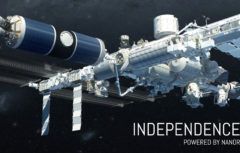Aug 28, 2018
NASA Langley collaborates with industry to develop space technologies
Posted by Chiara Chiesa in categories: business, economics, space
NASA is partnering with U.S. companies and small businesses to develop technologies that have the potential to significantly benefit the economy and future NASA missions.
Recent announcements of selections for the agency’s Tipping Point solicitation and Phase II of NASA’s competitive Small Business Technology Transfer (STTR) program include several proposals with NASA’s Langley Research Center in Hampton, Virginia.
NASA selected 10 Tipping Point proposals totaling approximately $44 million and Langley is a partner on one $3 million proposal. The agency also selected 20 research and technology proposals — valued at $15 million — from 19 American small businesses for STTR Phase II and Langley will manage three of the selected proposals totaling $2.25 million.
Continue reading “NASA Langley collaborates with industry to develop space technologies” »

















